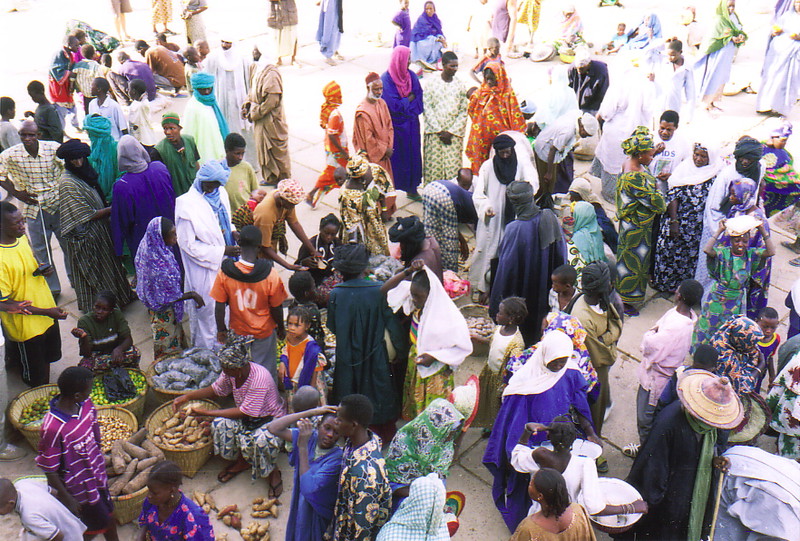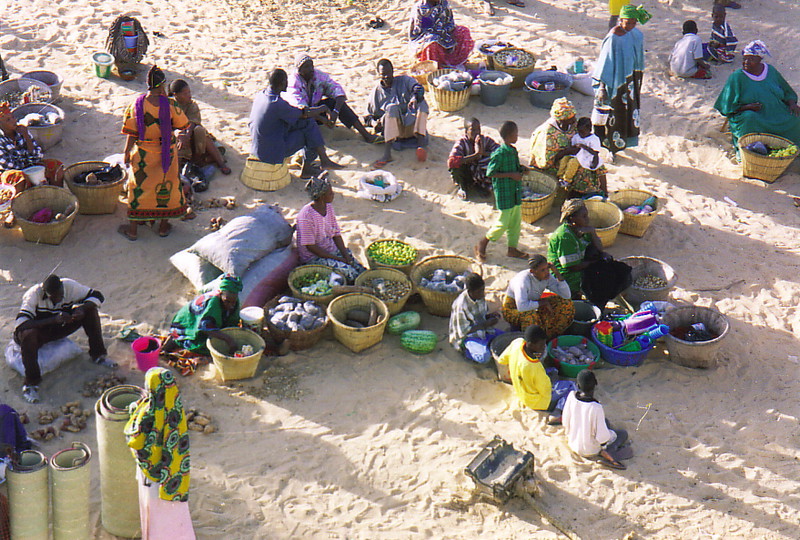
As the public ferry slopes into the remote town of Bamba, some 280km west of Gao on the northern tip of the River Niger's long arc through Mali, the market literally comes to town. For concealed in the belly of the steel CMN ferry are the women and children of the Niger's floating market.
When you board the ferry and pick your way over the piles of strange-smelling herbs and between the bulging sacks of fruit, you could be forgiven for thinking that the lower deck is total chaos. Women lie on woven mats thrown on the oily steel floor, boiling up strange looking meals, cleaning their children's faces or stacking plastic containers into neat piles. It looks as if they're classic fourth class passengers, roughing it out among the rattle of the engines and the smoke from the nearby kitchen, but these families live on the bottom deck for a reason; it's their job.
I found out all about it from a cheeky little Nigerian boy, who'd moved to Ghana and then Mali as his family circumstances had slowly deteriorated, and who cheerfully sold us oranges and bananas from his stash down below. He and his adoptive family ply their way up and down the Niger on the ferry, selling fruit at all the stops, and paying their way from the proceeds, turning in a profit and therefore a living as they float between ports. As offices go, there are worse places than the belly of the Niger ferry.
The Market Arrives

As the boat judders into port, sliding in the current until it's facing upstream, the crowds on the quay are poised, frozen like a scrum just before the ball is thrown in. There are maybe three or four hundred locals crowding on the quay, splashes of colour beside the light brown mud houses that squat round the port like ancient, weather-beaten castle turrets, dwarfed by the dunes that lead off downstream. Everything is surprisingly still, wound up with anticipation, until finally the ferry draws alongside. As soon as the first person can jump the gap between boat and quay, the levee breaks and all hell breaks loose.
A fat mama sets up shop right beneath the side of the boat, selling bags of the Ghanaian staple fufu from a big plastic bucket, and taking absolutely no shit from the people queuing up to buy her bags of doughy goo. A confused-looking boy pulls a goat on a string through the melee, the goat as tripped out by the chaos as the boy. A young woman manages to control five baskets of busy buying, one of them containing something that looks exactly like wood chips, and which rustles as she scoops it up in an old Nestlé tin and pours it into her customers' black plastic bags; the other baskets contain onions, red chillies, dried beans and small yellow limes, the colours blurring as people throw CFA coins at her and she drops handfuls of goods into their bags.

One woman walks through the throng carrying what look like slabs of marble on her head, but they turn out to be slabs of salt, mined in the north of Mali by the Bella and Haratin tribes, who work for their Arab and Tuareg masters for a pittance, in a relationship that is slavery in all but name. The salt slabs are shot through with veins of purple and black, impurities from the beds of the ancient dried-up lakes where the salt comes from. More modern, a young girl sells plastic scoops and buckets, right next to an old woman who waves straw hats, mats and shoes around, trying to smile her way to a sale. In the distance the meat vendors lay out their cuts of prime beef in front of a block of wooden stalls, which on closer inspection turn out to be school desks.
While there's a chance, groups of kids dash on board and run up the stairs to talk to the passengers or just wave at their friends down below, each of them dressed in something completely different; some are smart and clean, in shirts and trousers, and some are in ripped T-shirts and dirty shorts, clothes that probably started life in the West before being dumped in a charity box and being shipped out to Bamba.

Suddenly the ferry's horn blasts once, twice, three times, and the already hectic scene changes into one of sheer pandemonium. The stall holders leap up and rush to get their buckets of merchandise stowed safely back on the lower deck, while locals try to catch last-minute bargains, handing over coins in return for hastily packaged bags of lemons, onions and dough. As the ferry starts to pull away from the quay a woman leans dangerously far over the water, managing to catch the thrown money in her bucket with expert precision. Finally the ferry drifts far enough away for the bartering to die down, and slowly people wave goodbye to the ferry for another week, while the lower deck counts the profit and gets ready for the next frantic port of call, a few hours downstream.